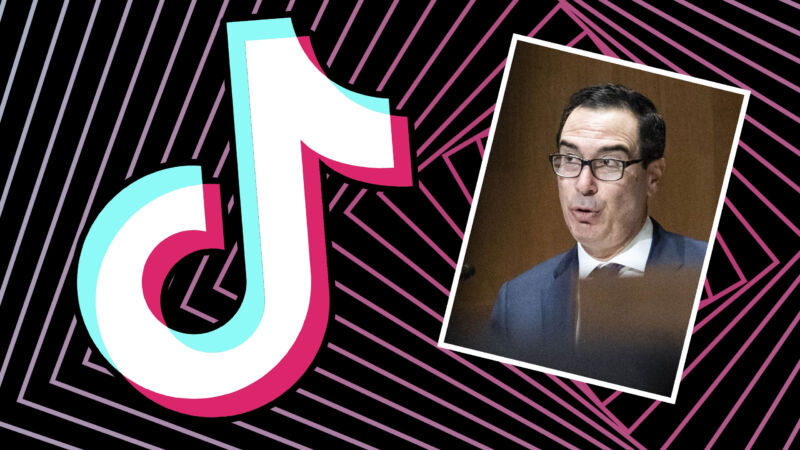
Aurich Lawson | Getty Images Pool
Former US Treasury Secretary Steven Mnuchin is reportedly assembling an investor group to buy TikTok as the US comes closer to enacting legislation forcing the company to either divest from Chinese ownership or face a nationwide ban.
“I think the legislation should pass, and I think it should be sold,” Mnuchin told CNBC Thursday. “It’s a great business, and I’m going to put together a group to buy TikTok.”
Mnuchin currently leads Liberty Strategic Capital, which describes itself as “a Washington DC-based private equity firm focused on investing in dynamic global technology companies.”
According to CNBC, there is already “common ground between Liberty and ByteDance,” as Softbank—which invested in ByteDance in 2018—partnered with Liberty in 2021, contributing what Financial Times reported was an unknown amount to Mnuchin’s $2.5 billion private equity fund.
TikTok has made no indication that it would consider a sale should the legislation be enacted. Instead, TikTok CEO Shou Zi Chew is continuing to rally TikTok users to oppose the legislation. In a TikTok post viewed by 3.8 million users, the CEO described yesterday’s vote passing the law in the US House of Representatives as “disappointing.”
“This legislation, if signed into law, WILL lead to a ban of TikTok in the United States,” Chew said, seeming to suggest that TikTok’s CEO is not considering a sale to be an option.
But Mnuchin expects that TikTok may be forced to choose to divest—as the US remains an increasingly significant market for the company. If so, he plans to be ready to snatch up the popular app, which TikTok estimated boasts 170 million American monthly active users.
“This should be owned by US businesses,” Mnuchin told CNBC. “There’s no way that the Chinese would ever let a US company own something like this in China.”
Chinese foreign ministry spokesperson Wang Wenbin has said that a TikTok ban in the US would hurt the US, while little evidence backs up the supposed national security threat that lawmakers claim is urgent to address, the BBC reported. Wang has accused the US of “bullying behavior that cannot win in fair competition.” This behavior, Wang said, “disrupts companies’ normal business activity, damages the confidence of international investors in the investment environment, and damages the normal international economic and trade order.”
Liberty and Mnuchin were not immediately available to comment on whether there’s any serious interest so far from investors.
But according to the Los Angeles Times, Mnuchin has already approached a “bunch of people” to consider investing. Mnuchin told CNBC that TikTok’s technology would be the driving force behind wooing a variety of investors.
“It would be a combination of investors, so there would be no one investor that controls this,” Mnuchin told CNBC. “The issue is all about the technology. This needs to be controlled by US businesses.”
Mnuchin’s group would likely face competition to buy TikTok. ByteDance—which PitchBook data indicates was valued at $223.5 billion in 2023—should also expect an offer from former Activision Blizzard CEO Bobby Kotick, The Wall Street Journal reported.
It’s unclear how valuable TikTok is to ByteDance, CNBC reported, and Mnuchin has not specified what potential valuation his group would anticipate. But if TikTok’s algorithm—which was developed in China—is part of the sale, the price would likely be higher than if ByteDance refused to sell the tech fueling the social media app’s rapid rise to popularity.
Back in 2020, ByteDance weighed various ownership options while facing a potential US ban under the Trump administration, The New York Times reported. Mnuchin served as Secretary of the Treasury at that time. Although ByteDance ended up partnering with Oracle to protect American TikTok users’ data instead, people briefed on ByteDance’s discussions then confirmed that ByteDance was considering carving out TikTok, potentially allowing the company to “receive new investments from existing ByteDance investors.”
The Information provided a breakdown of the most likely investors to be considered by ByteDance back in 2020. Under that plan, though, ByteDance intended to retain a minority holding rather than completely divesting ownership, the Times reported.




















+ There are no comments
Add yours